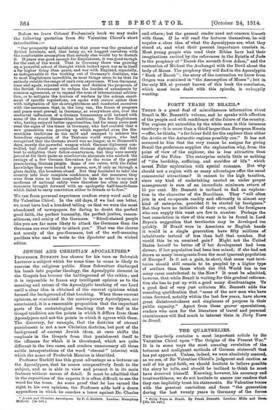JEWISH AND CHRISTIAN APOCALYPSES.*
PROFESSOR BIIREITT has chosen for his turn as Schweich Lecturer a subject which for some time to come is likely to exercise the religious public. Since Schweitzer discharged his bomb into popular theology, the Apocalyptic element in the Gospels has become the battleground of the critics ; and it is impossible to frame any intelligent opinion as to the meaning and extent of the Apocalyptic teaching of our Lord until a clear idea is obtained of the current opinions which formed the background of that teaching. When those current opinions, as contained in the contemporary Apocalypses, are ascertained, it is a reasonable proposition that the important parts of the eschatological teaching that we find in the Gospel tradition are the points in which it differs from those Apocalypses and not the points in which it agrees with them. The discovery, for example, that the doctrine of eternal punishment is not a new Christian doctrine, but part of the background of current Jewish ideas, at once shifts the emphasis in the Gospels from that punishment itself to the offences for Which it is threatened, which are quite different in the two eases, and renders unnecessary all those subtle interpretations of the word "eternal " (aicmios) with which the name of Frederick Maurice is identified.
Professor Burkitt has this great advantage as a lecturer on the Apocalypses, that he comes comparatively fresh to the subject, and so is able to view and present it in its main features without excess of detail. It must be admitted that in the expositions of the experts it is often difficult to see the wood for the trees. As some proof that he has earned the right to his own opinions, the Professor adds half a dozen appendices in which he couches a lance against Dr. Charles
• Jsitish and Christian Apocalypses. By F. C. Burkitt. London: Humphrey Milford. [3s. net.j
and others; but the general reader need not concern himselt with these. If he will read the lectures themselves, he will acquire a clear idea of what the Apocalypses are, what they aimed at, and what their present importance consists in. Most young people who read their Bibles have had their imaginations excited by the references in the Epistle of Jude to the prophecy of "Enoch the seventh from Adam," and the contention of Michael the Archangel with the Devil about the body of Moses. The prophecy they will find in the Apocalyptic " Book of Enoch " ; the story of the contention we know from Origen was contained in "the Assumption of Moses " ; but in the only MS. at present known of this book the conclusion, which must have dealt with this episode, is unhappily wanting.


































 Previous page
Previous page